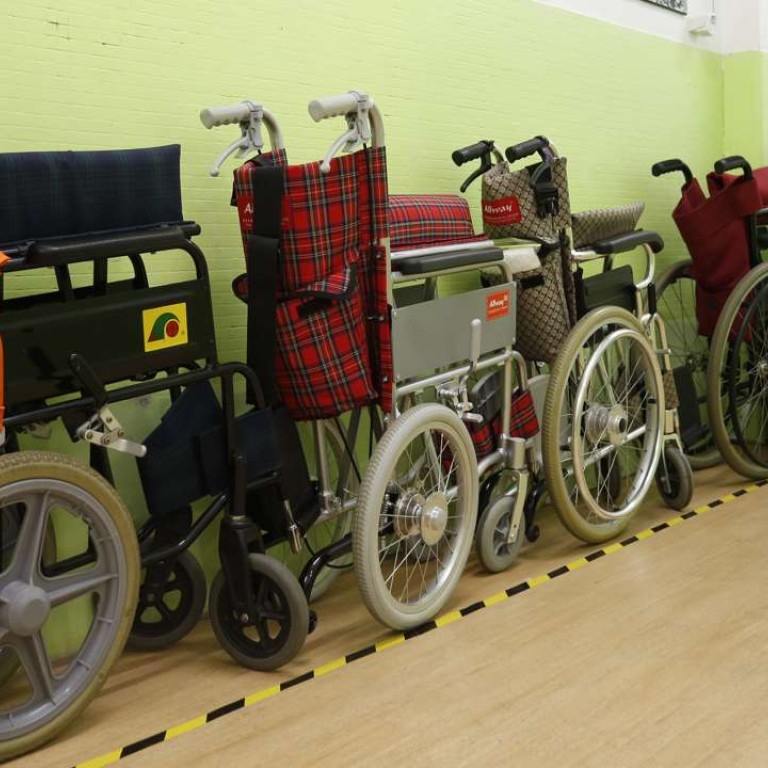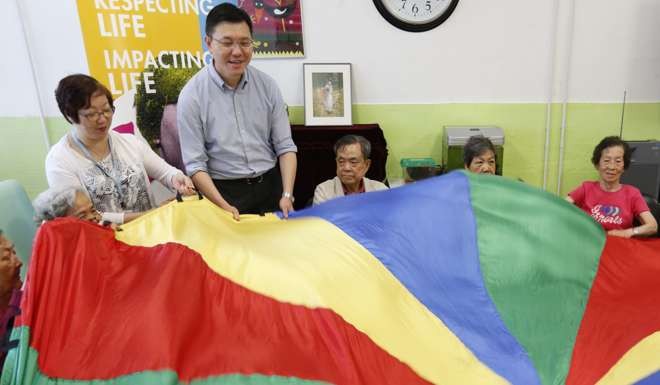
Hong Kong families bear burden of dementia as patient numbers rise
With Hongkongers living longer, there will be more than 300,000 suffering from dementia within 15 years. Specialised day-care centres cannot meet current demand for places, so who will care for those affected?
Selina Tang had the twilight of her career all planned out. She had been working as an IT programmer and switched to a less taxing clerical job to ease into retirement.
Her plan was disrupted in April 2015 when her 89-year-old mother slipped and fell. She was rushed to hospital, where she spent several months recovering.
“She was strapped to the bed to prevent her from getting up on her own, and at times she couldn’t recognise us, which scared us,” Tang recalls. “That was when the doctor told us she had dementia, and we were so shocked. Before, when she was forgetful, we just thought she was getting old.”
Tang and her five siblings had little time to figure out what to do with her mother after she came home from the hospital, and the doctor didn’t have much help or advice to offer, but a hospital social worker gave them a list of day-care centres to contact.
Tang and her younger brother were tasked with looking after their mother around the clock, which left them physically and mentally exhausted. They had to escort her to the bathroom in the middle of the night, and she would sometimes shout out in distress.

With Hongkongers living longer, he estimates that within 15 years there will be more than 300,000 people in Hong Kong with dementia. Dai says it is therefore critical that family members recognise signs of dementia early and act quickly to delay the onset of the worst effects of the condition and put in place long-term care plans.
“Our association educates general practitioners to diagnose early signs of dementia and help families arrange treatment. We now know more about Alzheimer’s than in the past 10 years, though this chronic disease is not curable. Medication only accounts for 30 per cent of care; the rest of the help comes from family members.”
Dai and other experts in the field recently submitted a report to Secretary for Food and Health Dr Ko Wing-man, listing recommendations for how to tackle the tsunami of dementia cases ahead, and on August 31 Chief Secretary Carrie Lam Cheng Yuet-ngor announced a two-year pilot project starting in February 2017 that will provide more dementia-specific resources to day-care centres for the elderly, benefiting about 2,000 people.
Still, the burden of primary care still falls on families. “When people have dementia, they become disengaged. Activities help them live with family and at home to reintegrate and socialise,” Dai says.
This entails more conversing with others, writing, doing simple maths problems, making simple arts and crafts, and physical exercise, to help keep their minds active.
Although there are more than 200 subsidised day-care centres for the elderly in Hong Kong, only about 20 cater specifically to dementia patients, who need more physical and mental care.
Tang managed to get her mother into Haven of Hope in Shau Kei Wan about six months ago and it has been a godsend, she says, even though her mother goes there only twice a week.
“You rescued me,” she says as she holds the arm of senior nurse Margaret Chiu Kit-ching, and dabs her eyes with a tissue.

“They need to slowly adjust to coming here, and then after a while they get used to it because they get to know us and feel safer,” Chiu says. “As a caregiver, you have to accept the situation and take it one step at a time. You can’t be upset and you need to be relaxed when dealing with loved ones with dementia.”
She gives Tang tips on how to help her mother, such as writing down what time she will come home so she won’t worry, always touching or hugging her if she is distressed, not getting annoyed when she doesn’t remember things, and treasuring the time she has left with her.

The cost of attending a day-care centre ranges from HK$100 to HK$300 per day, though not everyone can afford it. If an elderly person is diagnosed with dementia, however, he or she is eligible for a Community Care Service voucher that allows them entry into one of the special day-care centres, but only 1,200 of these vouchers are issued each year.
For more severe cases, those with sundown syndrome – who have behavioural issues at night, get confused or suffer anxiety, yell and even attack family members – there is just one facility in Kennedy Town, called Haven of Hope Memory Care for Elderly.
Greater awareness of the disease in Hong Kong is due largely to Nobel physics laureate Professor Charles Kao Kuen, known as the “father of fibre optics”, and his wife Gwen Kao Wong May-wan. The couple set up the Charles K Kao Foundation for Alzheimer’s Disease in 2010, after Kao was diagnosed with the condition.
Wilfred Leung Chi-hang, general manager of the foundation, says patients with sundown syndrome can be quiet and stay in a corner all night, or walk up and down a corridor. The foundation subsidises families using the Kennedy Town service to help them catch up on much-needed sleep.
Since the centres cater only to those over 70, Leung says, those diagnosed with dementia in their 60s – and in some cases their late 40s – are usually homebound and their condition rapidly deteriorates.

“You need to engage the whole family so that everyone knows their loved one’s functional level, and can help them use their strengths and adapt to their weaknesses, and perhaps modify interiors like bathrooms to make daily living easier. If you can make caring easier, it helps the family relationship.”
It was difficult to find people like Tang willing to talk about the challenges of looking after a loved one with dementia.

The specialist says Hong Kong is becoming more dementia-friendly, with some 400 certified care planners. Although this falls far short of the needs, it’s a start, he says, and since early 2015, the association has teamed up general practitioners in Tsuen Wan, with the Hospital Authority in New Territories West and social workers to make it easier for families to cope by providing them with information and support.
With some adjustments, Tang and her siblings are seeing improvements in their mother’s condition. “We talk to her more and she knows we love her. But if we talk too much she becomes quiet. We are still accepting the situation and learning new ways to look after her.
“I now find time to do exercise like tai chi, and my brother can now go hiking and take photographs to de-stress. But I’m afraid of the day when she doesn’t recognise me any more.”

